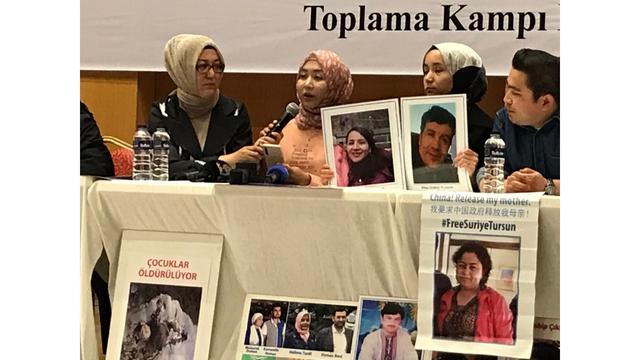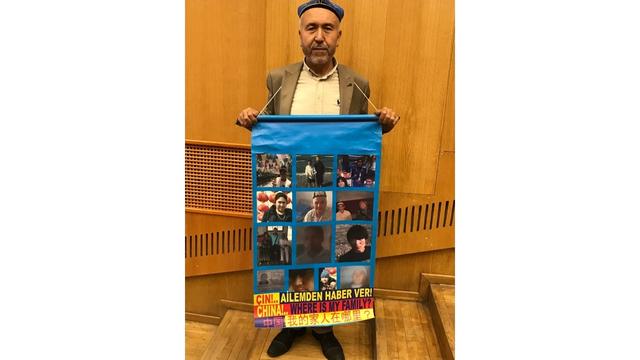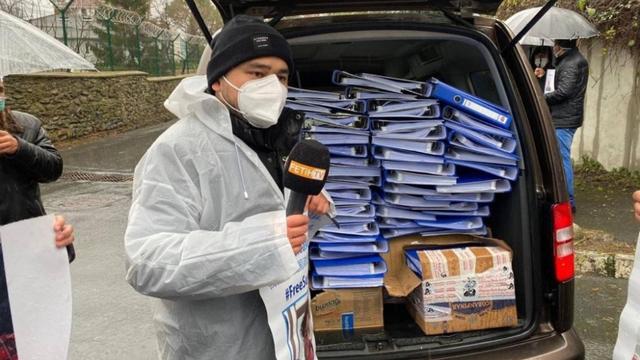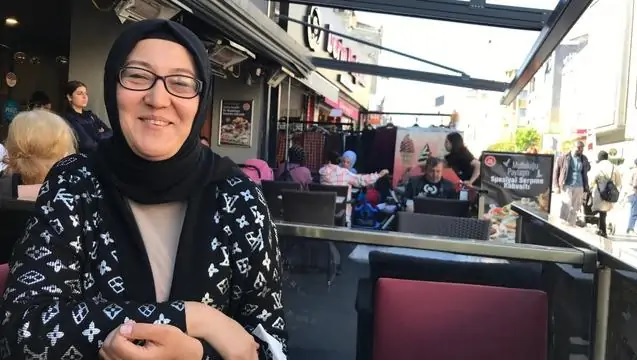An interview with the quiet mother of three who created a grassroots movement to challenge the might of Beijing.
by Ruth Ingram
Bitter Winter, 09/03/2022
“Does the world need videos of our women being raped, of the evenings we spend frozen in fear as Chinese so-called relatives creep into our beds while our men languish in camps, and of women past childbearing age lying splayed on operating tables for sterilization, before it will wake up to the tragedy that is happening in our homeland?” asks Medine Nazimi, a Uyghur mother of three who became an activist overnight when her younger sister disappeared into the black hole of Chinese internment camps.
Anyone less like an activist would have been hard to find, explains the 39-year-old president of the Turkey-based group “Chinese Concentration Camp Victims,” when she looks back on her former life as an entrepreneur and home maker. She has put her dreams for obscurity and a quiet life on hold in the relentless pursuit of justice for her people with an urgency and passion she never knew she was capable of. She now spends every waking minute consumed by a need to tell the world what is happening to her sister and the relatives of a 50,000-strong Turkish Uyghur diaspora, all desperate to know what has become of their loved ones.
If she fails in this task, who will take it up? she asks, as she watches the international community pitch in to condemn Russia for its invasion of the Ukraine, but remain largely silent on the Uyghurs’ plight. She is in no doubt that had their catastrophe hit the headlines with bombs and the wholesale destructions of cities, the world might have taken more notice. “But because the creeping persecution has been largely invisible and the whole-scale roundup of more than ten percent of our people hidden from public view, an indifferent world can get away with largely business as usual,” she says defiantly.
She never set out to be a hero or an influencer, but following a few social media forays in 2019 to publicize the plight of her sister Mevluda, who had vanished in the homeland, her campaign started to take off. Other frantic parents, brothers, sisters and children joined forces, and by July 2020, sixty had come forward who were willing to stand together in a public square in Istanbul holding photos of the disappeared.

With this the resistance was birthed. Turkey’s media until then had been largely silent on the Uyghur atrocities, and exiled Uyghurs, afraid to rock their fragile residency boat and risk deportation, kept quiet. But silence was beginning to feel like complicity and had achieved nothing for those at home. They threw caution to the wind, and their first embryonic protests attracted the attention not only of the Turkish government but the Turkish people. A persistent campaign of marches, rallies, petitions and social media posts and videos soon won their hearts and public opinion turned in their favor.
Their peaceful protests under the banner of “Chinese Concentration Camp Victims” on behalf of their country folk who had committed no crime, and their dogged efforts to force the hand of Chinese officials in Turkey to at the very least find their mothers, brothers, fathers, and children took them to the highest echelons of Turkish government. Their trans Turkey odyssey covering the entire nation in 31 cities, captivated leaders, school children, women’s groups, housewives and villagers drawn into their story.
But still the Chinese government was deaf to their pleas. Not one relative was produced and not a single reason was given as to why hundreds of thousands of innocent people had been wrenched from their daily lives simply for their choice of clothing, their religious observance, the books they read, the names they gave their children, and the language they preferred to speak.

The Chinese government from time to time, unnerved and embarrassed by their protests, taunted them with a carrot. “Stop your protests, erase your social media campaign blackening our name, and we will see what we can do,” they promised, leaving Medine and her cohort more determined than ever to ignore the empty promises and refuse to back down.
After months of stonewalling from the Chinese government, despite many attempts to present their case to staff behind the impenetrable walls of the building, their first 17-day vigil outside the Chinese embassy in Istanbul seemed to break the deadlock. The adverse publicity that started with 12 Uyghurs standing silently with placards of missing relatives drew hoards of supporters who sustained them physically and mentally, until more than 100 gathered each day to draw attention to the tragedy that has enveloped their lives. Chinese officials finally gave in, and agreed to examine the evidence.
Five thousand, one hundred and ninety-nine files containing the details of their lost relatives were accordingly packed into a van and delivered to the Chinese embassy in the pouring rain, but were turned away. Undeterred, with the help of Turkey’s top journalists, they had the news broadcast around the world.

Nazimi is remarkably composed and restrained when she speaks about Beijing and its denial of their cause, but the facade crumbles when she speaks of the personal tragedy that has propelled her into activism.
“The only ‛crime’ my sister had committed was coming to Turkey,” said Medine, unable to stem her anger and grief as she poured out her story. Called home from studies in Istanbul to care for their ailing mother, she then married and had a child but in common with hundreds of thousands of her compatriots she was inexplicably earmarked for “re-education” in 2017 as the internment drive gathered momentum. Barely a month after her release in 2019 she was re-arrested, taken from her mother and her now two-year-old toddler, and disappeared. She has not been seen since. The grief finally killed her mother, and the toddler now lives with Medine’s younger brother and father.
Whilst refusing to give the group answers in public, the Chinese government is not silent behind the scenes. Members of the group have been contacted individually. Relatives are brought into police stations in the homeland and forced to denounce their daughters and sons, brandishing them as traitors and liars. Others have been told to erase their social media or their relatives would be interned. Medine was contacted in June 2020 and guaranteed news of her sister if she stopped campaigning. “I asked them what crime she had committed? I asked them why the thousands of Chinese who come to study and travel in a Turkey aren’t all arrested and put in camps? I asked them why they couldn’t release my sister and return her to Istanbul,” she said. “But they just told me I had misunderstood. They told me to go away, to cool down, and rethink.”
But instead of backing down, the group’s momentum has grown. Their recent initiative in January 2022 on behalf of 19 of their members, to file a case against 112 Chinese officials through Turkish courts, citing 116 missing relatives, was accepted, and they are waiting the result. “The wheels are moving slowly but we hope in the end Interpol will be able to issue red notices against these officials,” she said confidently. “Any of these officials travelling to any signatory country will be arrested.”
The group was devastated by what they claim to have been a propaganda coup by China following UN Human Rights Commissioner Michelle Bachelet’s recent whistle stop visit to the region. They had sent submissions to Geneva on the eve of her visit begging her to find and visit their relatives, demanding their release. “They are illegally imprisoned and detained,” said Medine. “The visit was a whitewash.”
Medine will not rest until her sister is released. “Every waking moment Mevluda is in my mind. Every time we are knocked back, ignored or mocked by the Chinese government, I think of her and she gives me the strength to carry on,” she says. “Everyone in our group is like this. The world might move onto another crisis, but our relatives are still suffering the most unimaginable horrors. Some are being released from the camps but they are sick. Some can’t walk after their torture. Some are so mentally traumatized they can barely speak. Some have died. We owe it to them to stay hopeful and not give up,” she said.

